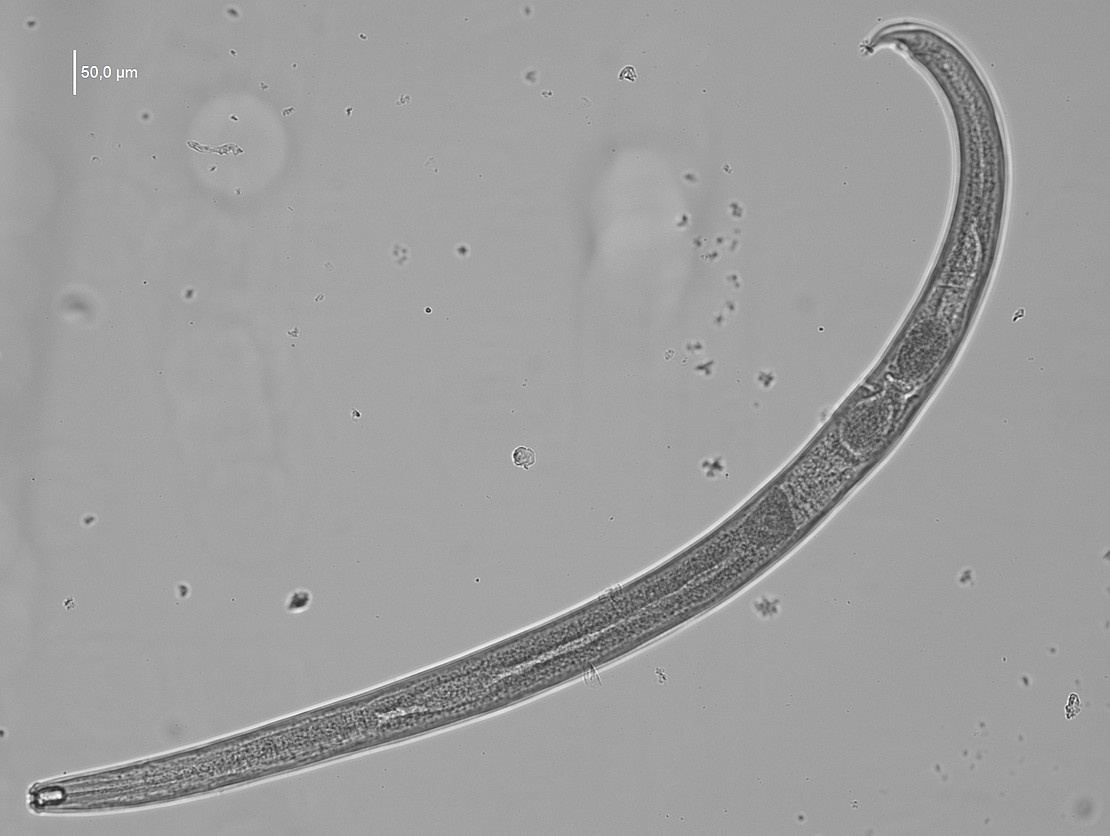This page contains automatically translated content.
New species of nematode discovered in northern Hesse
 Image: Grażyna Winiszewska.
Image: Grażyna Winiszewska.Nematodes are mostly small, colorless worms; over 10,000 individuals can occur in 100 milliliters of fertile soil. More than 20,000 species are known. Most species feed on bacteria and fungi, thereby affecting nutrient cycling and are a significant component of the soil ecosystem. Others parasitize insects and are used in biological pest control. However, numerous nematodes also suck on the roots of crops as pests themselves. The now discovered species Prionchulus sturhani has a body length of less than 2 millimeters and is characterized by a round head and a relatively short tail.
Agricultural scientists from the Department of Ecological Plant Protection led by Prof. Dr. Maria Finckh are investigating the influence of sustainable farming systems on soil and plant health at the trial field in Neu-Eichenberg. While plant health can be measured well based on the occurrence of pests, it is costly and difficult to measure soil health. One indicator of soil health is soil-dwelling nematodes, particularly predatory species. Predatory nematodes feed on other nematodes and small soil animals, making them an important component of the soil food web. They are at the bottom of the food chain and are sensitive to any soil disturbance. The occurrence of predatory species is thus a reliable indicator of an undisturbed and healthy soil ecosystem. This was also very impressively demonstrated in the trials in Neu-Eichenberg. While plowed croplands did not show any predatory species, high densities of predatory nematodes were found in some non-plowed areas.
Some of the soil samples taken during the trial were taken by apl. Prof. Dr. Johannes Hallmann to the Julius Kühn Institute, Federal Research Institute for Cultivated Plants, in Münster for further investigations. There, visiting scientist Dr. Tam Vu from Vietnam, an expert on predatory nematodes, took a closer look at the animals. She found that the dominant species had not yet been described. She made up for this together with her Polish colleague Grazyna Winiszewska and named the new species Prionchulus sturhani, after the recently deceased nematologist and renowned taxonomist Dr. Dieter Sturhan. The original paper appeared recently in the journal Annales Zoologici.
The Department of Ecological Agricultural Sciences at the University of Kassel is located in Witzenhausen and maintains experimental agricultural plots in Neu-Eichenberg and elsewhere.
Link to original article: https://doi.org/10.3161/00034541ANZ2018.68.3.001
Contact:
Apl Prof Dr Johannes Hallmann
University of Kassel
Professorship of Nematology
Tel: +49 251 87106 25
Email: johannes.hallmann[at]julius-kuehn[dot]de